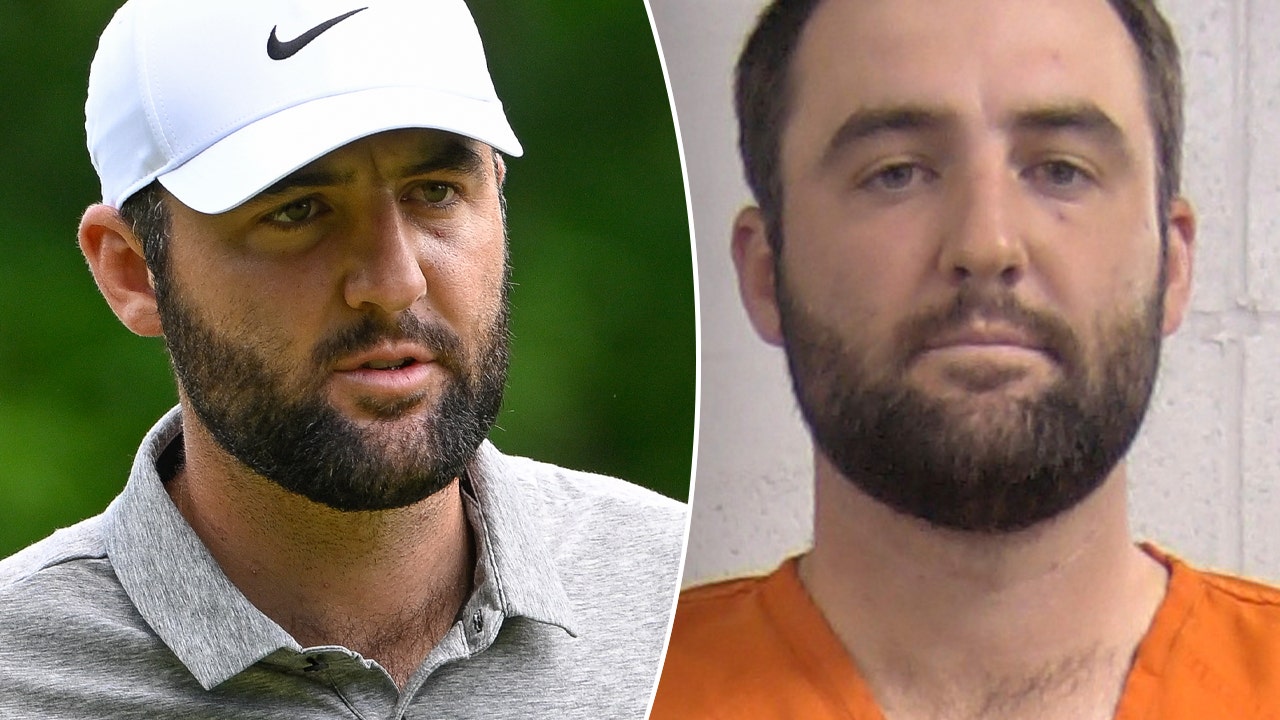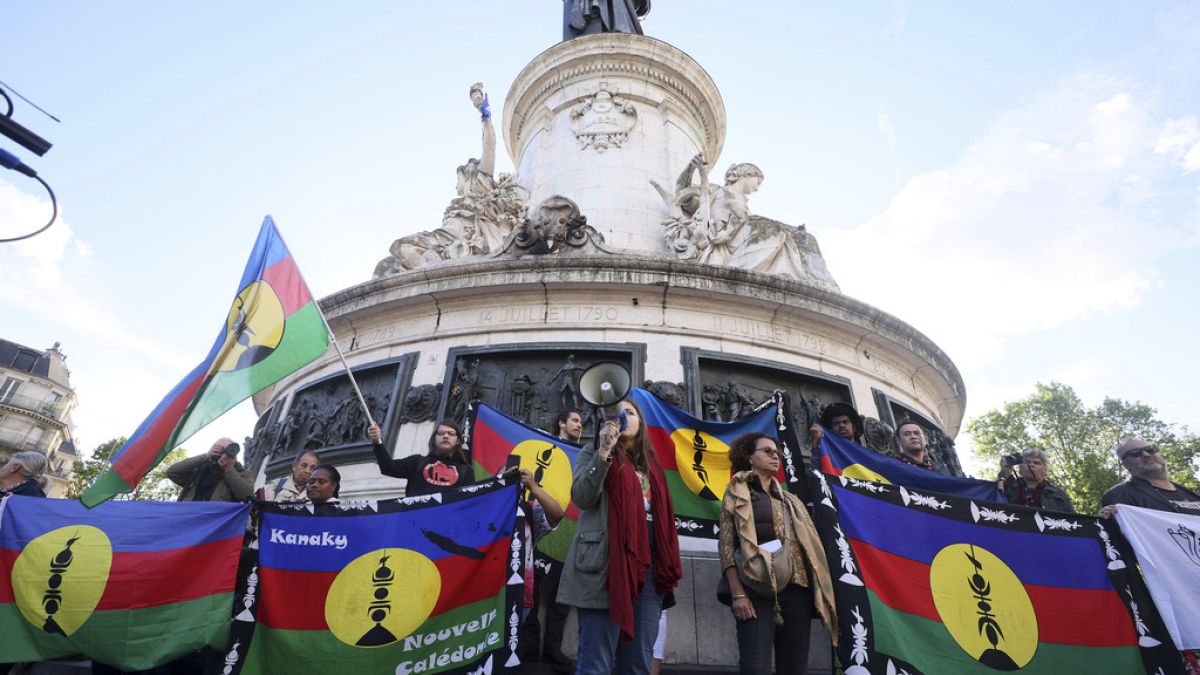Nevada
Exclusive records show Nevada athletics ran afoul of Title IX. Its leaders shrugged.
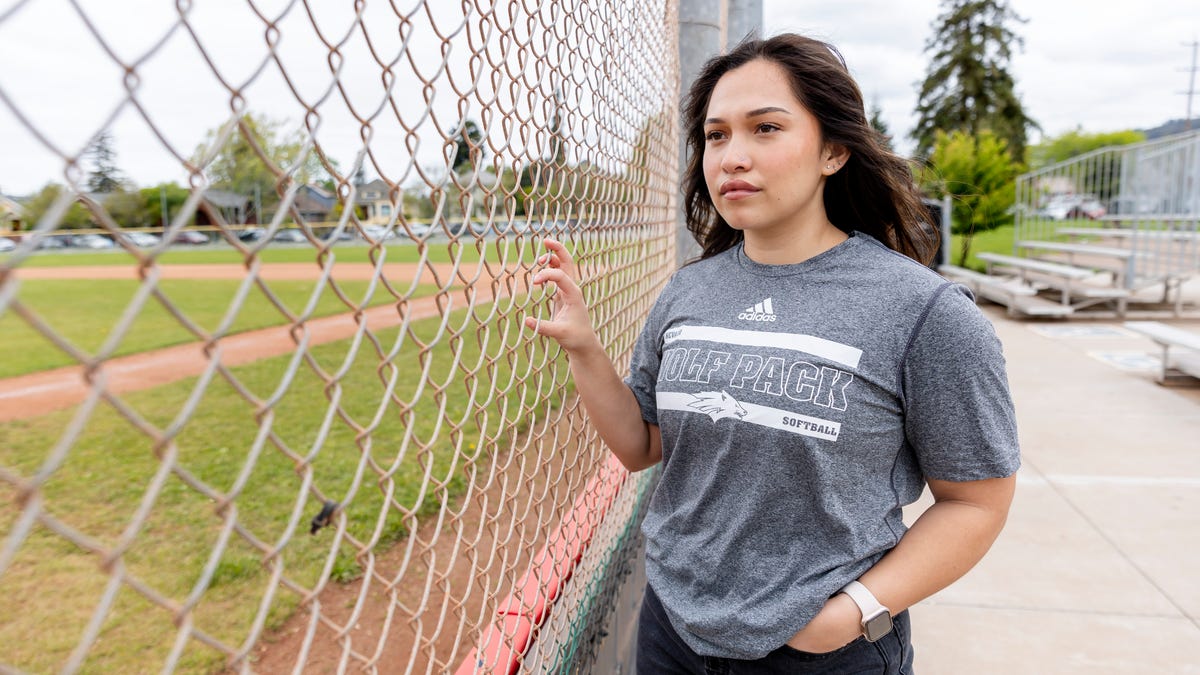
Many hours they should have spent practicing, Aaliyah Rivas and her teammates roamed the University of Nevada, Reno softball field carrying shovels and buckets instead of bats and balls.
The athletic department rarely maintained the field. So plowing snow, pulling weeds and picking rocks, trash and goose poop out of the grass fell to coaches and players.
The team had complained for years about its dilapidated facilities. The dugout toilets didn’t flush. The field lacked lights, which meant games could be played only in the daytime, when many fans were in class or working.
Its locker room – a 10-foot-wide converted metal shipping container – lacked running water and the doors didn’t lock. Many players changed into their uniforms in their cars.
The Nevada baseball team suffered none of those problems. Its field was well-maintained with artificial turf and stadium lights. Its spacious clubhouse featured bathrooms and showers, coach and player lounges, indoor batting cages and pitching mounds, a medical training room and a fitness area.
It was all a sad wake-up call for Rivas, whose lifelong goal had been to play NCAA Division I sports.
“You’d expect that at a D-I university, it would be different,” she said. “But women’s sports still got the bare minimum.”
The college was among many whose athletic departments had made progress toward treating male and female players more equitably in the decades after the enactment of Title IX, the landmark 1972 federal law that banned sex discrimination in schools.
But that progress all but stopped in 2013 under a new athletic director, Doug Knuth. Although he is not broadly known in the world of college athletics, Knuth’s impact was crushing for female athletes at Nevada, and he has since amassed significant power over the future of women’s sports on a national scale.
Knuth, who left the university in 2022, declined to be interviewed or answer questions for this story. In an emailed statement, he defended his track record, suggesting he was dealt a bad hand from the start.
“I am and always have been an advocate for women’s athletics throughout my career as a leader in college athletics,” Knuth said in his statement. “During my tenure at Nevada, I led several initiatives to help solve decades-long issues of inequality that predated my time at the university.”
USA TODAY interviewed more than two dozen current and former Nevada athletes and employees and reviewed thousands of pages of emails, equity reviews, facility plans, financial reports, fundraising records and other documents obtained via public records requests.
Multiple internal assessments since 2018 pinpoint disparities that put not just softball, but virtually every Nevada women’s team at a disadvantage in a wide range of areas, including facilities, recruiting, meals, travel, equipment, publicity and access to medical treatment.
USA TODAY Investigation: Funding of college sports falls short of law’s promise to women
The U.S. Department of Education Office for Civil Rights launched an investigation into Nevada athletics in 2019 for allegedly violating Title IX. Even with outside eyes on them, the school’s top officials, including the president, did little to address the problems.
When university leaders send a message that women don’t matter, women come to accept and expect unfair treatment, which is how cultures of sexism and discrimination perpetuate, said Elizabeth Taylor, a Temple University professor who studies diversity and inclusion in the sport industry.
“It forces women to wonder why they would continue to report or try to fight in a system where they’re not supported,” Taylor said. “So they just continue to operate in these spaces where they are mistreated.”
Recently, under a new president and athletic director, Nevada has started closing the athletic gaps. But former school leaders allowed the problems to fester for so long – while funneling money toward luxuries for men’s teams – that full solutions are now tens of millions of dollars out of reach.
Workplace complaints dog new athletic director
About 50 people gathered in the auditorium of Legacy Hall on the UNR campus to hear from the three finalists for the athletic director job.
The winner would follow in some large footprints. Cary Groth, the school’s athletic director since 2004 and one of the first women to run an NCAA Division I program, was retiring after three decades in the industry.
Knuth, a former tennis captain at the University of Connecticut, brought 18 years of experience at five college athletic departments, most recently the University of Utah.
He was the youngest candidate for the job at 40 and the only one with no experience running a Division I athletic department. But he sold himself on his fundraising prowess, intimate knowledge of the Mountain West Conference and “laser-like focus” on athlete well-being.
“My job is not a fundraiser,” Knuth said at the March 2013 public forum. “It’s all about how we transform lives.”
Knuth got the job. He wasted little time wooing wealthy Wolf Pack boosters. Within five years, Nevada cut the ribbon on a $14 million football stadium upgrade, new football locker room and player lounge, state-of-the-art basketball practice gym and six outdoor tennis courts.
Erik Musselman, a former NBA coach Knuth hired in 2015, led the Nevada men’s basketball team to three-straight Mountain West Conference titles and the Sweet 16 round of the NCAA Tournament. A surge in ticket sales, sponsorships and licensing deals followed.
Revenue for the department reached $38 million by the 2018-19 school year, NCAA financial reports show – up $11 million since Knuth took over. University President Marc Johnson and the Board of Regents rewarded him, increasing his annual salary from $285,000 to $400,000.
“Doug has excelled in every expectation we’ve had for our department of intercollegiate athletics since his arrival,” Johnson said in a March 2016 press release.
Behind the scenes, however, complaints were stacking up about Knuth’s treatment of women in the workplace.
Several former employees complained that Knuth overwhelmingly hired men for major roles, paid men more than women who were equally or more qualified, and routinely excluded women from meetings, trips and other opportunities, according to interviews, emails and other documents.
The university hired a local law firm in 2018 to investigate allegations that Knuth created a hostile work environment for women, according to invoices and former employees. Among those interviewed by the firm was Carol Scott, who had been Nevada’s team physician since 1994.
Scott told USA TODAY that Knuth did not meet with her for weeks after he started, despite her requests. Later, she said she heard that he was uncomfortable with a woman in the football locker room. He ignored her medical advice, she said, and excluded her from eating with the team and riding on its bus.
Scott said she felt Knuth was trying to push her out.
Eventually, it worked: Scott quit in 2015 and moved full-time to the student health center. Knuth hired two men to replace her.
“If it wasn’t so sad and so unfair, it would be laughable,” Scott said. “He was just allowed to get away with it over and over and over.”
The school also twice investigated allegations of an inappropriate relationship between Knuth and an assistant cheerleading coach who worked for the department from 2011 to 2018, Johnson, then the university president, told USA TODAY.
By 2016, Knuth and the coach, Marci Banes – both then married to others – had become friendly, emails show. That May, Knuth invited her to stay with him during a two-day business trip to La Jolla, California, where he would be sleeping at a donor’s house.
“Direct flight to/from for only $298,” Knuth wrote her in an email from his UNR account. “I’ll split it with you.”
Knuth and Banes each divorced their spouses around late 2018, court and property records show. They married the following year.
According to Johnson, none of the investigations found Knuth violated any school rules.
Knuth, who is now athletic director at Southern Utah University, addressed the investigations in general terms in his emailed statement.
“All I can tell you is I fully participated and fully cooperated in every review or investigation,” Knuth wrote. “I answered every question, including about gender inequities and my wife. Through each and following each, I was never made aware of any wrongdoing and was cleared of all accusations.”
Banes, who now goes by Marci Knuth, did not respond to phone or email messages seeking comment.
The university denied USA TODAY’s public records request for the investigation reports, citing a policy adopted by the Nevada System of Higher Education’s Board of Regents that broadly deems all personnel files confidential.
Gender equity concerns reach fever pitch
As female employees spoke out about Knuth, frustrations over disparate treatment grew among Nevada’s female athletes.
Amid all the success for men’s sports, the women felt left behind.
Several women’s teams’ practice and competition facilities weren’t up to standard. That included the women’s indoor and outdoor track and field teams – Nevada does not sponsor men’s track and field – which account for more than 40% of the school’s roster spots for female athletes.
Nevada’s outdoor track, which wraps around the football field, runs beneath bleachers added decades earlier for extra seating at football games. The resulting tunnel means runners disappear from sight for a few hundred feet each lap, rendering the track unsuitable for meets; the team must travel for every competition.
Women also run indoor track, a winter sport, even though the campus has no indoor track. They practiced outdoors, sometimes amid snow and ice, said Hiley Dobbs, who ran track and cross country for Nevada from 2016 to 2021.
Although the athletic department’s maintenance team regularly plowed snow for football, Dobbs said track athletes several times had to shovel snow themselves.
“I remember our coach saying, ‘We’re a blue-collar team, we work hard,’” she said. “And I remember thinking that’s not something football or basketball would have to do. They don’t have to mop the floor of the gym.”
Locker rooms were another glaring problem. While 85% of male athletes had access to an exclusive locker room, only 17% of athletes on women’s teams did, a 2020 assessment by the school’s Title IX coordinator found.
The women’s swimming and diving team’s locker room was open to the public – used by patrons of the school’s public pool.
The soccer, track and field, and cross country teams shared one locker room, which doubled as the locker room for visiting football teams. Forced to vacate it on football game days to make room for the visiting team’s men, the women sometimes returned to find their equipment damaged or stolen, according to a 2018 Title IX compliance review.
Among the female athletes, women’s basketball players had it best. Their facilities were mostly on par with the men. But men’s basketball players got many more perks.
During Knuth’s tenure, the men’s team spent double what the women spent on travel – $4.8 million vs. $2.3 million, NCAA financial reports show. While Knuth had inherited a similar gap from his predecessor, under him, it widened. No other Mountain West Conference school spent more on its men’s team or had a bigger disparity.
Men’s basketball regularly flew to and from games on specially chartered flights, which have no other passengers, layovers or security lines. The women almost always flew commercial, taking long bus rides to get to the cheapest airports.
Hotel folios show the men’s basketball team regularly purchased custom banquet-style buffets for breakfast, lunch and dinner. Their breakfasts, which often featured a personal omelet chef, sometimes exceeded $100 per person. The women often bought groceries and ordered takeout.
Division I schools typically provide food to athletes, who burn thousands of calories a day. But food was scarce for Nevada female athletes.
In 2019, the men’s basketball team started dining out on the athletic department’s dime three or more times a week at Archie’s Giant Hamburgers and Breakfast, a popular restaurant near campus, transaction records obtained by USA TODAY show – even during the off-season. The school paid for the women’s basketball team to eat at restaurants only on game days and while traveling.
A daily spread of healthy meals and snacks in the weight room was reserved only for the men.
The topic of equal treatment came up several times in discussions with coaches and administrators, said Sami Dinan, a Nevada women’s basketball player from 2016 to 2020. Each time, they responded that the men got more opportunities because they were nationally ranked, and the women’s team was not.
“I don’t agree with it,” Dinan told USA TODAY. “If there was more investment, maybe we would have done better.”
Julia Jensen, a Nevada softball player from 2018 to 2021, was among those who voiced concerns about the unequal conditions facing female athletes. As president of the Wolf Pack’s Student-Athlete Advisory Committee, she met with Knuth regularly.
Jensen and other athletes raised the issue at meetings, minutes show, and in year-end surveys. They even discussed the inequities in a Zoom meeting with the state’s senior U.S. senator, Catherine Cortez Masto.
“The administration knew our concerns and they had known them for a long time,” Jensen told USA TODAY. “We didn’t feel like it was asking too much.”
Federal government intervenes, then disappears
The letter landed with UNR President Marc Johnson on a Wednesday in 2019, the day before Halloween.
It came from the U.S. Department of Education Office for Civil Rights, the federal agency that enforces Title IX: The office had received a complaint against the Nevada athletic department.
“The complainant alleged that the university discriminates, based on sex, against female student athletes,” it said, by failing to provide men’s and women’s teams comparable facilities and recruiting resources. “OCR will proceed with the investigation of these allegations because the allegations raise a possible violation of Title IX.”
It should have come as no surprise.
A year earlier, an outside law firm hired by the school to assess the athletic department’s Title IX compliance found several “areas of concern,” including with practice and competition facilities, locker rooms and nutrition.
The university had done little to address the issues, however. It commissioned some designs for facility upgrades and installed the shipping container at the softball field as a makeshift locker room.
Faced with the potential of a full-blown federal investigation, the university opted to go another route.
Before submitting any of the documents the Office for Civil Rights investigator requested, the university asked to voluntarily resolve the case – the administrative equivalent of a settlement. The federal agency agreed.
The agreement, signed in December 2019, required UNR to first conduct an internal assessment. The university’s then-Title IX coordinator, Maria Doucettperry, submitted a 26-page report in April 2020 that acknowledged significant gender gaps in facilities and recruiting.
If the agency approved the assessment, the next step would have been for the university to develop and execute an action plan, with progress reports every six months.
Education Department spokesperson Vanessa Harmoush declined to discuss what happened next with USA TODAY, saying the agency does not talk about cases that are under monitoring.
But according to UNR spokesperson Scott Walquist, the university never heard back from the Office for Civil Rights, so it never developed or submitted its plan.
“Although OCR never accepted or responded to the review, the University has addressed a number of items within the report,” Walquist said. Among the upgrades around that time, the school added electricity and a new scoreboard to the softball field.
After USA TODAY contacted the Education Department for comment, the Office for Civil Rights on April 17 sent UNR its first correspondence in four years, saying it was “currently preparing a response” to the school’s 2020 assessment.
Complaints about women’s teams’ facilities were near constant during Johnson’s presidency from 2011 to 2020, he told USA TODAY. He said he was unwilling to spend taxpayer and tuition dollars on improvements unless they benefited all students, not just athletes.
Johnson justified men’s basketball and football facility expansions during his tenure by noting they were largely donor-funded and necessary to increase revenue for the whole department, but he acknowledged that the lopsided approach could violate Title IX.
“If we were called on it or investigated and were given sanctions of some kind, we would have to respond,” Johnson said. “We had complaints, not sanctions.”
“If I responded to every complaint I ever had,” he added, “I would just be responding to complaints all the time.”
Title IX campaign struggles amid fourth investigation
In early October 2020, a new president took over at the University of Nevada, Reno.
Brian Sandoval, the state’s former two-term Republican governor, was briefed in his first weeks on campus about the athletic department’s gender inequity problems, he told USA TODAY.
“Without exception,” he said, “every women’s sport needed help.”
Sandoval quickly addressed some of the lower-hanging fruit, launching a fund to provide meals to female athletes, commissioning new facility designs and raising the salaries of coaches of women’s teams – all below the conference median.
There was little money, however, to address the department’s biggest facility deficiencies. The school faced a 12% pandemic-related budget cut from the Legislature. The athletic department was $9 million in debt and operating in the red, financial reports show.
Knuth started planning a fundraising campaign at Sandoval’s request in April 2021, emails show. Called Elevate, Knuth billed it as a celebration of Title IX’s upcoming 50th anniversary, according to draft campaign brochures.
Early on, Knuth emailed top administrators a wish list of 23 “Title IX” facility projects in order of which was likely to happen soonest. The eight highest-priority projects all directly benefited football and men’s and women’s basketball. Most would do little to address the gender disparities; some would actually widen them.
The No. 1 priority: Remodeling the football and soccer locker rooms.
The last priority? A new track for the women.
Two of the university’s vice presidents asked Knuth to re-rank the list in order of need. Knuth replied it was already in “priority order,” adding that projects for virtually every sport – football, soccer, basketball, track, baseball, swimming, tennis and others – could be considered the highest priority.
“I’m not being flip,” Knuth wrote, “but every project is greatly needed.”
After a year courting donors, Elevate was scrapped. The campaign “and its supporting documentation/materials lacked the detail and specificity needed from Athletics to officially launch,” Sandoval told USA TODAY in an emailed statement.
It’s unclear how much money Knuth and his team of fundraisers raised during that time. In some internal documents, they claimed to have brought in more than $20 million. But that figure consisted mostly of pledges made prior to Elevate, and almost all of it was earmarked for projects primarily benefiting football, baseball, and men’s and women’s basketball and tennis.
According to donation data provided by the university, Knuth as of April 2022 had raised little money for the teams that needed it the most: $30,000 toward a locker room for the women’s swimming and diving team; $23,000 for softball stadium upgrades; and nothing for women’s track.
Meanwhile, Sandoval greenlit several of Knuth’s high-priority projects, including a new $12 million building for men’s and women’s basketball with swanky locker rooms and player lounges. Construction is underway.
As the Elevate campaign floundered, the university quietly conducted a fourth investigation into Knuth’s conduct toward women.
A female athletic department employee complained to the university’s Title IX office in March 2021 that Knuth made disparaging comments about pregnant women. She accused the school of turning a “blind eye” toward Knuth’s sex discrimination in a letter her attorneys wrote to Sandoval that May.
“While the above outlined issues have fallen on deaf ears in the past,” the letter said, “we remain hopeful that under your leadership these issues will finally be addressed.”
The school hired a Las Vegas law firm that June to investigate the woman’s claims, emails and invoices show.
One year later, the employee received a one-page letter from Doucettperry, the Title IX coordinator. No investigation report or rationale for the findings was attached – a standard practice at other universities. The university would not provide it to USA TODAY either, citing the same policy that deems personnel files confidential.
“A preponderance of the evidence does not support a conclusion that you or other University employees within the Athletics Department were subjected to unlawful discrimination, harassment or retaliation,” the May 2022 letter from Doucettperry said.
“The investigation is now closed.”
Knuth gets payout, new home and NCAA award
The sky was still dark when Nevada softball coaches and players arrived at their makeshift locker room early one morning in March 2022 to pick up their gear ahead of a crucial road series.
Inside the navy blue shipping container, they quickly discovered that thousands of dollars worth of bats, gloves, equipment bags and sunglasses had been stolen.
The thieves appeared to have stayed a while. The team’s snacks had been eaten. A pair of pants and cheap camouflage glasses had been left behind. Several bags had been piled into a mattress of sorts.
“There was a homeless person we thought was living in there,” said Rivas, then a sophomore on the team.
A campus police investigation found no signs of forced entry and that the door locks didn’t work, emails show – even when latched, the doors could be pushed open. Linda Garza, the school’s softball coach, expressed concern for her players’ safety in an email to Knuth and others.
The incident prompted Nevada athletes from several teams to speak publicly about the state of their facilities. Some posted on social media. The local news picked up the story.
Two athletes met with Knuth to discuss their concerns, emails show. Knuth later told Sandoval that it was “a really good conversation.”
Sandoval wasn’t having it.
“The feedback that I received from the meeting was that the athletes continue to be frustrated and were not at all satisfied with the meeting,” Sandoval emailed Knuth back on April 6. “I was also informed that you laid the blame for the deficiencies associated with athletics facilities with administration.”
When Knuth’s contract came up for renewal two weeks later, Sandoval did not renew it. The university ultimately paid him $308,000 to leave. In a press release, Sandoval thanked Knuth for “the many positive steps he made” for the athletic department.
Sandoval named Knuth’s replacement that June: Stephanie Rempe, previously a deputy athletic director at Louisiana State University. Rempe has helped push across the finish line new locker rooms for women’s swimming, track and field, cross country and other teams, an initial round of softball stadium upgrades and track repairs, thanks in large part to a $6.9 million subsidy from the academic budget.
The university used another $2.3 million Knuth raised to remodel the football locker room and carve out a separate locker room space for women’s soccer. The football players got a video wall, barber shop, new shower area and new lockers; their old lockers were refurbished and given to women’s teams.
Today, most female athletes have a quality locker room. Softball players aren’t among them. While they continue to await a long-promised clubhouse, indoor practice facilities and lights – at an $11 million price tag, according to a 2022 estimate – they were given a second shipping container.
“The strides made over the past three and a half years in upgrading facilities for women’s athletics and bolstering the Office of Equal Opportunity and Title IX underscore our commitment to structural and organizational improvements, aligning with the evolving needs and expectations of our University community,” Sandoval said in a statement to USA TODAY.
Southern Utah University named Knuth its new athletic director in December 2022. He was appointed six months later to the NCAA Division I Council, one of 40 people with a seat at the mostly-male table that makes key decisions affecting all 190,000 Division I athletes across the country, half of whom are women. Knuth chairs the legislative committee, which makes recommendations on the merits of new rule proposals.
In March, Knuth was one of three men to receive an NCAA award for being a champion of diversity, equity and inclusion. A press release praised him for his “focus on providing opportunities for women and people of color” dating back to Nevada, and for hiring a woman as his deputy at Southern Utah.
The release didn’t mention that the woman, Marie Tuite, is perhaps best known for her role in a sexual abuse scandal at San Jose State University.
A 2021 investigation by the U.S. Department of Justice found that San Jose State officials had violated Title IX for more than a decade by failing to adequately respond to repeated complaints against Scott Shaw, its sports medicine director from 2008 to 2020 who last year was criminally convicted and imprisoned for sexually assaulting female athletes.
Tuite was the school’s athletic director from 2017 to 2021 and a senior department administrator for the seven years prior.
The Justice Department also substantiated complaints by two employees who said Tuite retaliated against them when they tried to hold Shaw accountable by issuing one a negative performance review and firing the other.
The school demoted Tuite, who ultimately resigned.
Tuite did not respond to a request for comment but her attorney, Susan Bishop, issued a statement: “At no time during my client’s tenure at SJSU did any student-athlete come forward to Ms. Tuite with an allegation of inappropriate touching by Head Athletics Trainer Scott Shaw.”
Southern Utah did not answer questions from USA TODAY, saying in a statement that Tuite and Knuth were thoroughly vetted.
The school also denied USA TODAY’s public records request for documents reviewed by the committee that hired Knuth, including his application and background check. It provided only a copy of his resumé.
On his resumé, Knuth listed his top professional accomplishments at Nevada. The third item down:
“Launched campaign focused on gender equity.”
Kenny Jacoby is an investigative reporter for USA TODAY covering sexual misconduct and Title IX. Contact him by email at kjacoby@usatoday.com or follow him on X @kennyjacoby.

Nevada
‘More like therapists’: adult virgins turn to Nevada brothels for sex – and healing

At Bella’s Hacienda Ranch, a brothel on the outskirts of the rural Nevada truckstop town of Wells, a half-priced special for adult male virgins this May has gone off with a bang.
What may seem like a publicity stunt has compassion behind it. May is Mental Health Awareness Month in the US, and the brothel’s 74-year-old namesake owner and operator, Madam Bella Cummins, wants to raise awareness of what she describes as a “virginity epidemic”. She blames digital platforms supplanting young people’s in-person, “IRL” experiences, leading to stunted social development. Brothels, she argues, offer a safe space to work through resulting feelings of anxiety, shame and isolation.
Most of the courtesan’s clients, to use the industry parlance, live in the region, yet increasingly men travel from around the country and the world, seeking out her business for “help”, as they often word it. To receive the discount, men must provide a letter from a mental health professional acknowledging their claim, which Cummins hopes encourages some adult virgins to seek therapy when they otherwise wouldn’t.
So far, the promotion has proved a hit. In a typical week, at least three adult virgins walk through the door, but according to Cummins, reservations from virgin clientele have increased this month by tenfold.
Clearly these services are meeting a growing demand. The virgin special also highlights the underappreciated role sex workers play to help with emotional, as well as physical, needs. Staff at Bella’s Hacienda and other Nevada brothels say many clients are seeking a judgment-free zone that offers sexual healing as a professional service.
Cummins notes that sensual touch releases hormones in the brain that allow us to feel “fully functional” as human beings. When those chemicals remain suppressed, the madam observes, people go to “very dark places”, such as internalising feelings of severe inadequacy and distress, or turning to unhealthy sexual behaviour.
“The only reason we are in these bodies is the touch, and so that we can have sexual encounters, even if it’s just a one-night stand,” says Cummins.
“I’d really like to bring awareness to this issue,” she adds. “There is a safe, healthy way to solve the situation.
Growing anxiety and social isolation
There is evidence that adult virginity and sexual inexperience are on the rise in the US, Canada and other western countries, according to Marie-Aude Boislard, director of the Canada Research Chair in developmental sexology. Approximately 15% of individuals born in the 1990s are virgins in their early 20s, the highest rate of sexual inactivity since 1985. Many report “difficult emotions” and interpersonal struggles due to social stigma, the dearth of visibility of sexual inexperience in adulthood and a lack of intimacy.
Cummins has been in sex work for 38 years and is now the longest-serving madam in Nevada’s legal brothel industry. She’s seen her virgin clientele reflect shifting societal moods and norms.
She recalls how in the 1980s, it was common for long-haul truckers to introduce their adult virgin sons to brothel services. Dad would take the young man on the road during the summer after he finished high school, accompany him through the potentially awkward process of choosing a woman in a line-up, then enjoy a drink at the bar while his son got that first sexual experience under his belt.
Beginning in the 1990s, more often it was mothers who brought their inexperienced offspring to the “cathouse”, and not just for the young man to lose his virginity, but so that he might gain confidence interacting with a woman, receive guidance on pleasuring a woman and learn about the sensual side of sexual intimacy.
These days, Cummins said, virgins tend to show up alone. Some act shy about it, but most openly share their status, if only to apologise for their perceived haplessness.
“When we’ve never done something, the fear associated with doing it wrong – being inept or inadequate – it takes us over,” she mused. “They say, ‘Look I really want to learn what I’m supposed to do here.’ Others say: ‘I’m feeling distress about something my hormones are pulling me toward.’ Or ‘What am I supposed to do to get over these feelings of inadequacy?’”
Located in north-eastern Nevada, Bella’s Hacienda Ranch is about an hour’s drive from Idaho and Utah, two states with highly religious populations that Cummins describes as the most sexually repressed in the country.
“They’re told, ‘You can keep this down. Don’t feel that,’” she says, referring to the abstinence culture in faith-based communities. “But how do you deny what God put in a young body – which is that desire?”
The issue goes beyond their proximity to Mormon country, however. The adult virgins visiting Nevada brothels also bemoan their screen-based social lives, as well as permanent shifts to online learning or remote work.
A virgin client of Bella’s Hacienda Ranch in his early 20s, a jiujitsu fighter from Salt Lake City, said social anxiety affects both men and women in his community.
“One thing I notice going to bars lately is that women are so used to dating apps and social media, when I approach a woman in person, they get flustered,” said the client, who asked to have his name withheld for privacy reasons. “Nobody knows how to interact with each other any more.”
‘The intimacy they’re missing’
For some people, brothels are a place to let go of old hangups in a supportive setting.
A 22-year-old tall, athletic cowboy from Utah who requested to use the pseudonym Barry went to Bella’s Hacienda Ranch to lose his virginity after ending a long-term relationship.
He grew up in a religious family but had only remained celibate out of respect for his longtime girlfriend’s abstinence beliefs. Recently, though, Barry learned that she was sleeping with other people, and they broke up.
“I felt kind of betrayed, and like I had waited for no reason,” he said. “So I decided to just, you know, go get laid.”
Losing his virginity at a brothel appealed to Barry because he didn’t want to get involved emotionally with anyone, yet still has a “very high” sex drive. Something transactional with a skilled partner and no expectations or stipulations regarding future contact seemed perfect.
Barry hired a blond, blue-eyed courtesan named Lila. “I just want vanilla sex,” he told her. “No BDSM, nothing kinky.”
Reflecting on the experience afterward, Barry said: “I would honestly recommend it more than just going to a bar and hooking up with a stranger. I probably didn’t go try to hook up with a random girl in my area for fear of being judged. Being able to be in a place where I could express myself and learn things privately was good.”
Often, adult virgins prefer to book appointments with the older courtesans at Bella’s Hacienda, trusting that the maturity, wisdom and compassion that come with age place them in good hands.
The story is much the same on the opposite side of the state, at a brothel closer to Sin City than to Mormon country. Cameron Sloane, a 43-year-old courtesan at Sheri’s Ranch in Pahrump, Nevada, identifies as “Your favorite MILF” on X. She receives many requests from virgin men in their early 20s. They are more intimidated by women their own age, but the “hot mom” fantasy is also part of the dynamic, Sloane says.
The primary skill she brings to these appointments is patience. She mentioned video games, and gaming culture, as another platform through which young men establish online relationships without face-to-face interaction, leaving them uncomfortable making eye contact or communicating what they want in a sexual encounter.
Recently, a young man wore sunglasses inside the brothel to avoid eye contact. Sometimes, a virgin client will shake when Sloane takes his hand to walk him to her room or look down when she places his palm on her thigh as they negotiate her price.
Sloane always feels out the client’s goals and interests, which can range from a quickie to get it over with and say he’d “done it” to a full-on learning session with guidance and feedback. Either way, she starts by letting them touch her and by helping them feel comfortable being touched.
Many virgins have a hard time staying present in their bodies, especially those who are addicted to pornography, Sloane says. Distorted thoughts of what they think sex is supposed to be like cause them to feel insecure or distracted. Sloane recalls a client who came to terms with his porn addiction during their session after he failed to climax through her sensual approach. He acknowledged that he had a problem and was going to seek help.
“We’re more like therapists than anything, and not just for virgins,” she says. “We have people who come in who’ve lost their wives recently and just need somebody to talk to and cuddle with or be close to. It’s more about companionship. I think that’s the most rewarding part of it – when you give someone the intimacy they’re missing.”
Barry, the Salt Lake City cowboy, believes that brothels can be a good place to get over sexual jitters, with added mental health benefits to boot.
“If you wanted to learn how to golf, you wouldn’t just show up to a golf course. If you did, you might embarrass yourself,” he says, reaching for a sports analogy. “So maybe if you’re a virgin and you want to have sex for the first time without embarrassing yourself – if you feel that might happen – a brothel might be a good place to start to get over the first-time nerves.”
The young man says he has done a lot of therapy and agrees that there’s an emotional angle, too: “I was able to let some stuff go, for sure.”
Nevada
Centennial girls, Shadow Ridge boys win 5A track team state titles
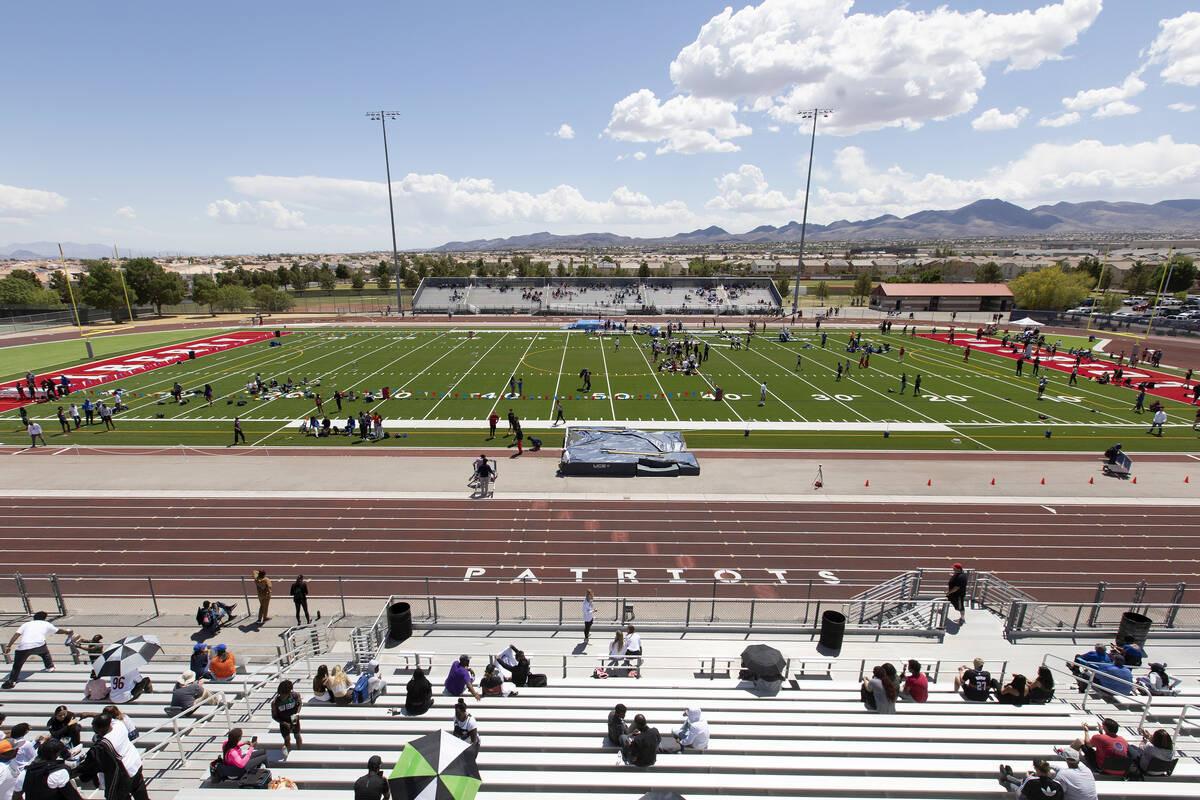
Centennial reclaimed its title as the state’s best girls track and field team by winning the Class 5A state championship Saturday at Carson City.
Centennial’s run of 10 straight state championships was snapped last season. The Bulldogs ran away with this year’s title with 122 points. Liberty, last season’s champion, was second with 79 points. Palo Verde finished third with 68.
The Bulldogs won the 4×100-meter (47.35), 4×200 (1:40.31) and 4×400 (3:48.44) relays as part of their team title.
Centennial’s Iyonna Codd won individual titles in the 100 meters (11.61 seconds), 200 meters (23.92) and 400 meters (53.49). Codd’s time in the 100 meters is a state record. She entered as the defending champion in all three events.
Kemarah Howard added individual titles in the triple jump (38-10) and high jump (5-10) for the Bulldogs. Howard was the defending champion in the high jump.
Palo Verde’s Tia Brown earned individual titles in the 300 hurdles (42.74) and long jump (19-4).
“It definitely feels good to get the girls state title back,” Centennial coach Roy Session said. “Our girls team was motivated by coming up short last year in the team title and have been working relentlessly to get their title back. Which they did. We had an amazing season led by the defending state champion and Nevada all-time record holder in the 100, 200 and 400 meters, Iyonna Codd.”
In the 5A boys meet, Shadow Ridge won the state title with 113 points. Liberty (97) and Faith Lutheran (85) were second and third, respectively, after being co-champions last year.
“Winning the 5A state championship is incredible,” Shadow Ridge coach Michael Smith said. “Since winning the 4A title last season and being put into 5A this season, our only goal was to show that we belong. The boys worked tremendously hard this season. All their effort shined here at the state meet.”
The Mustangs won the 4×800 relay (7:49.22) as part of their championship performance. Evander Thomas also claimed the individual title in the 200 meters (21.37).
“These boys know how to pick each other up,” Smith said. “If someone had a less-than-expected performance, another athlete would step up and make up for it. I couldn’t be more proud of how this team ended their season. Back-to-back state champions in two different divisions, sounds like a perfect ending to me.”
Faith Lutheran’s Preston Beery won individual titles in the shot put (66 feet, 3 inches) and discus (183-7) for the second straight year. Beery set the unofficial state record in the shot put earlier this month (68-10).
Bishop Gorman’s Chase McCallum claimed individual titles in the 800 (1:54.01) and 300 hurdles (38.67). Liberty’s Ronnie Kendrick successfully defended his title in the 400 (46.84).
Class 4A
Arbor View won the 4×100 (48.13), 4×200 (1:42.1) and 4×800 (9:39.54) relays to run away with the girls title with 180 points Saturday at Desert Oasis.
Bridget Guevara won individual titles in the 400 meters (57.63) and 800 meters (2:21.43) for the Aggies.
Desert Oasis finished second in the team competition with 131 points. Sky Pointe was third with 78.
Desert Oasis won the boys title with 134.5 points. Mojave finished second with 99 points and Green Valley was third with 88.
Kenan Dagge won individual titles in the 1,600 (4:20.18) and 3,200 (9:28.88) for Desert Oasis. Noah Lara claimed the title in the 110 hurdles (14.49) for the Diamondbacks.
Mojave’s Tony Williams won individual titles in the 200 (21.79) and 400 (47.54) meters.
Class 3A
Moapa Valley scored 100 points to win the boys title over Sparks (69) and Tahoe-Truckee (62) at Carson City. Mordechai Yadegar was Moapa Valley’s lone individual title winner, finishing first in the 3,200 (9:31.31).
Tahoe-Truckee won the girls title with 84 points. South Tahoe was second with 71. The Meadows was the top Southern school and finished fifth with 45 points. Boulder City’s Sancha Jenas-Keogh won individual titles in the 100 (12.40) and 200 (25.36) meters.
Class 2A
Coral Academy-Reno claimed the boys title with 127 points. Lincoln County was second with 119 points and Lake Mead Academy finished third with 77.
Coral Academy-Reno also won the girls title with 146.5 points. North Tahoe was second with 135. Tenaya Brown won her second straight title in both shot put (33-7¾) and discus (126-1) for Lake Mead Academy, which was the top Southern team. It finished fourth with 61 points.
Class 1A
Mineral County won the boys title with 129 points at Carson City. Smith Valley finished second with 111 points and Word of Life was third with 52.
Whittell won the girls title with 125 points. Wells was second with 91. Oriyah Clay won individual titles in the 100 hurdles (15.80), 300 hurdles (47.62) and triple jump (34-4) for Indian Springs, which finished third with 88 points.
Contact Alex Wright at awright@reviewjournal.com. Follow @AlexWright1028 on X.
Nevada
Southern team beats defending champs to win 5A softball state title
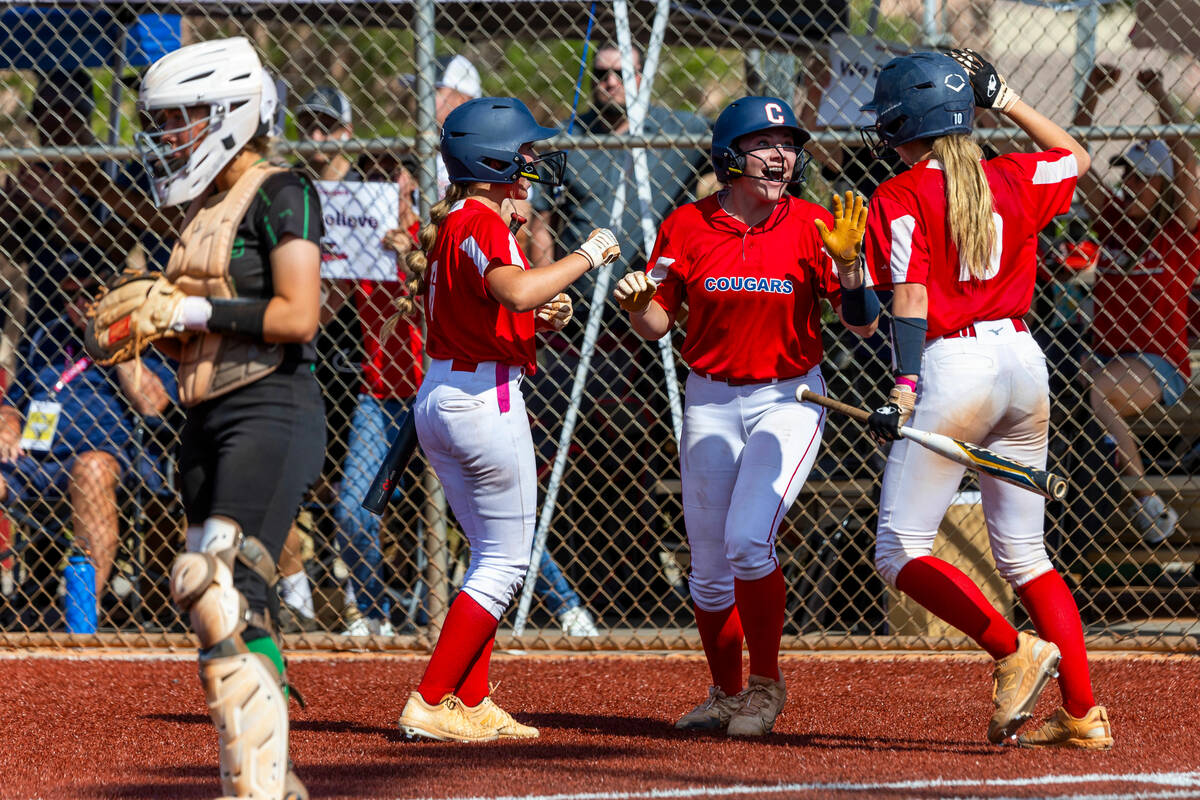
Coronado defeated defending champion Douglas 4-2 on Saturday at Bishop Gorman to win the 5A state softball title.
The Cougars, the No. 2 seed from the South, also defeated Douglas 8-3 in an opening round game Thursday at Bishop Gorman. Coronado advanced to the title game by beating Palo Verde 15-4 on Friday at Faith Lutheran.
This is a developing story. Check back for updates.
Contact reporter Jeff Wollard at jwollard@reviewjournal.com.
-

 World1 week ago
World1 week agoIndia Lok Sabha election 2024 Phase 4: Who votes and what’s at stake?
-

 Politics1 week ago
Politics1 week agoTales from the trail: The blue states Trump eyes to turn red in November
-

 World1 week ago
World1 week agoBorrell: Spain, Ireland and others could recognise Palestine on 21 May
-

 Politics1 week ago
Politics1 week agoFox News Politics: No calm after the Stormy
-

 World1 week ago
World1 week agoUkraine’s Zelenskyy fires head of state guard over assassination plot
-

 Politics1 week ago
Politics1 week agoUS Border Patrol agents come under fire in 'use of force' while working southern border
-

 World1 week ago
World1 week agoCatalans vote in crucial regional election for the separatist movement
-

 News7 days ago
News7 days agoSkeletal remains found almost 40 years ago identified as woman who disappeared in 1968


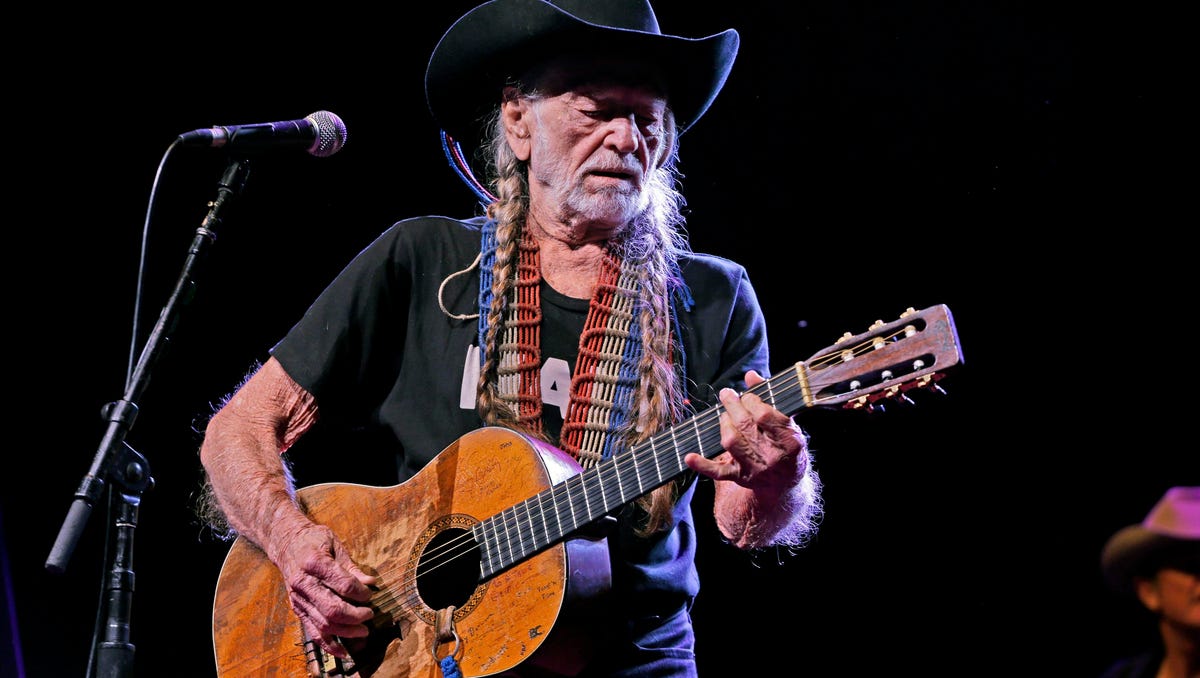
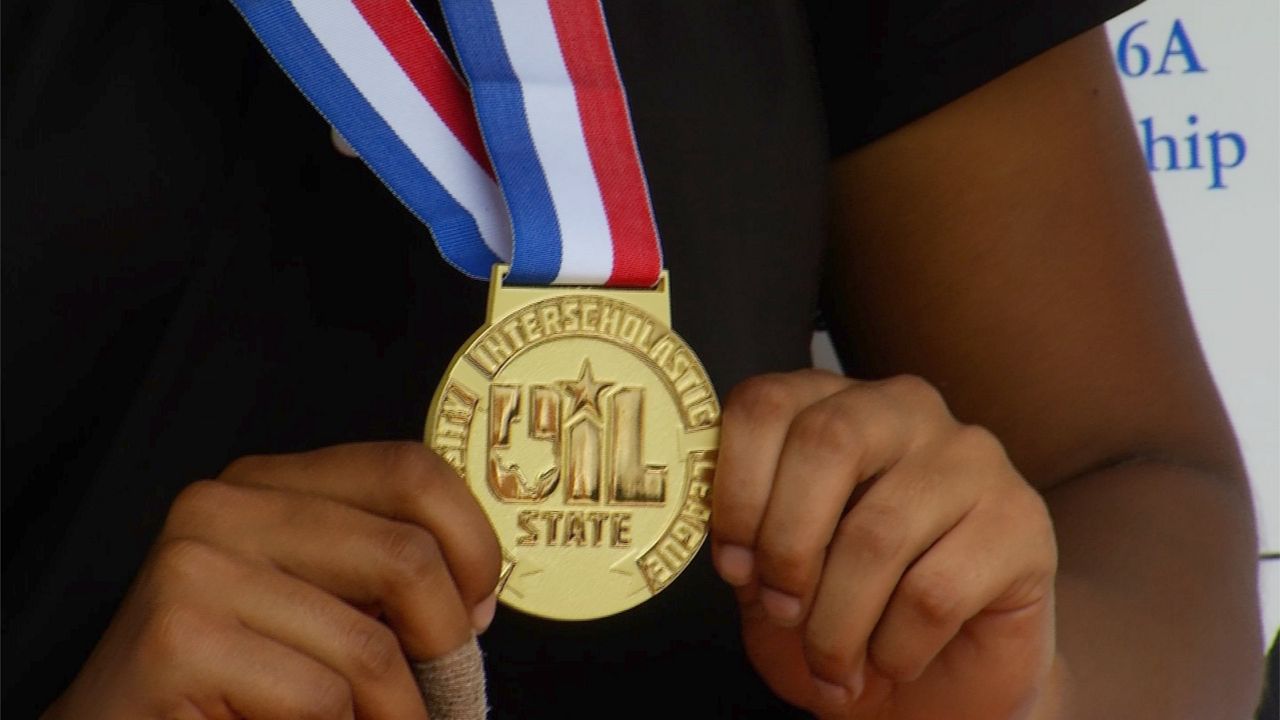

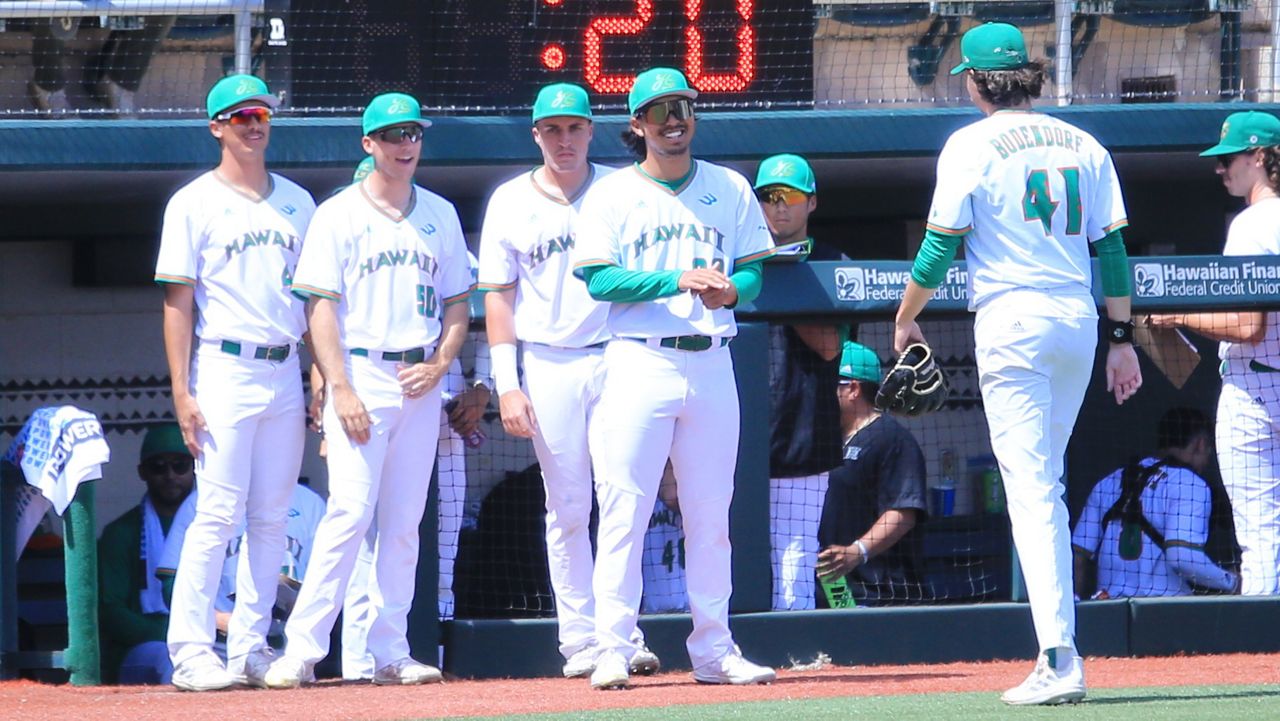

/cdn.vox-cdn.com/uploads/chorus_asset/file/25430225/247065_Vergecast_Gaming_Senses_Smell_SHaddad.png)


